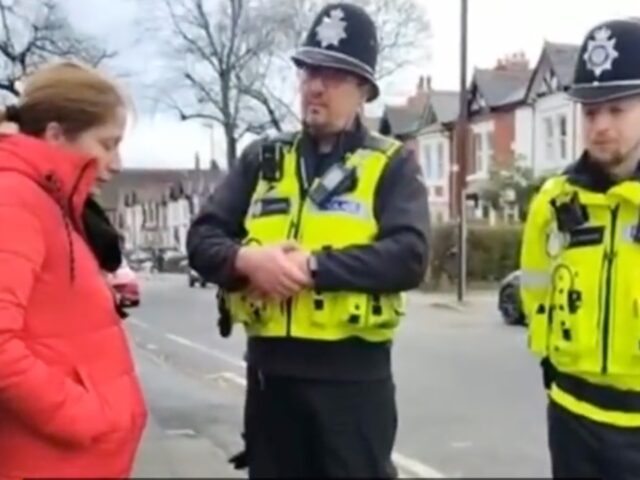A pro-life campaigner has been arrested for the second time for silently praying outside an abortion clinic in England, with police officers being filmed saying that “engaging in prayer” is an offence against the law.
The director of the UK March for Life, Isabel Vaughan-Spruce has once again been arrested for silently praying outside of an abortion clinic in Birmingham for allegedly violating a locally-imposed Public Spaces Protection Order (PSPO), which prohibits protests within a certain vicinity of the facility.
In footage posted online by ADF UK, the faith-based legal advocacy organisation that has been supporting Vaughan-Spruce in her legal battles, showed police officers demanding that she vacate the area. When she replied that she was not protesting, an officer was filmed replying: “But you’ve said that you were engaging in prayer, which is the offence”.
“I am not committing an offence, I’m not intimidating or harassing anyone and I’m not protesting,” the pro-life activist said.
Nevertheless, Vaughan-Spruce was arrested and bail conditions have been imposed prohibiting her from returning to the area surrounding the abortion clinic, even beyond the initial “buffer zone”.
🚨BREAKING: Isabel has been arrested, AGAIN, for THINKING.
MPs vote TOMORROW on banning silent prayer near all abortion facilities in🏴&🏴
"You've said you're engaging in prayer, which is the offense."
"Silent prayer."
"You were still engaging in prayer, which is the offense." pic.twitter.com/AId3OguiXz— ADF UK (@ADF_UK) March 6, 2023
The arrest comes just weeks after she was cleared of any wrongdoing for a similar incident in December outside the same abortion facility.
“Only three weeks ago, it was made clear by the court that my silent prayers were not a crime. And yet, again, I have been arrested and treated as a criminal for having the exact same thoughts in my head, in the same location,” she said in a statement.
“The ambiguity of laws that limit free expression and thought – even in peaceful, consensual conversation or in silent, internal prayer – leads to abject confusion, to the detriment of important fundamental rights. Nobody should be criminalised for their thoughts.”
Anglican Deacon and GB News presenter Calvin Robinson commented: “These officers made it clear, it is prayer that is the offence. It doesn’t matter if it’s silent prayer or not, the act of praying is offensive.
“Thought crime has no place in a liberal society. It’s anti-freedom of religion/worship/expression/speech.”
WATCH: Army Veteran Fined While Praying for Dead Son Outside Abortion Clinichttps://t.co/Ds28WaejXw
— Breitbart London (@BreitbartLondon) January 20, 2023
The governing Conservative (Tory) Party has, despite it’s name, so-far been largely supportive legislation from a far-left Labour MP to impose a national ban on protesting outside of abortion facilities throughout the entire country. The legislation, which will be voted upon on Tuesday in the House of Commons, would criminalise advising, informing, influencing, persuading, or even expressing an opinion on abortion within a 150-meter protest-free zone surrounding all clinics, with a penalty of up to two years in prison.
Ahead of the vote, Conservative MP Andrew Lewer proposed an amendment that would make an exemption for those engaging in silent prayer or for consensual conversations with mothers from the exclusion zone legislation.
Commenting prior to the vote, the legal counsel for Alliance Defending Freedom UK, Jeremiah Igunnubole said: “MPs will for the first time in Modern British history be able to vote to make it abundantly clear that there is no room for ‘thoughtcrime’ in modern UK law. It is deeply concerning that the basic rights of freedom of thought, peaceful expression, and individual liberty are even up for debate.
“This isn’t 1984, but 2023 – nobody should be criminalised for their thoughts, for their prayers, and for a consensual conversation on a public street.”
Igunnubole went on to say that the arrest of Vaughan-Spruce and the “clear confusion on the behalf of police officers about the status of freedom of thought under the law” demonstrates why the idea of imposing such buffer zones are “not fit for purpose in a democratic society.”
“We all stand firmly against harassment on public streets. Harassment is already illegal. A government review in 2018 found that harassment near abortion facilities is rare, and peaceful prayer and offers of charitable help were the most common activities there. The government concluded at that point that censorship zones would be disproportionate. No further reviews have since been conducted. What has now changed?
“MPs should use their vote today to uphold freedom to pray, and have consensual conversations, on our streets.”
WATCH: Pro-Life Activist Arrested for Thought Crime of Silently Praying Outside UK Abortion Clinichttps://t.co/UQ5PwsL2kE
— Breitbart London (@BreitbartLondon) December 23, 2022
Follow Kurt Zindulka on Twitter here @KurtZindulka

COMMENTS
Please let us know if you're having issues with commenting.